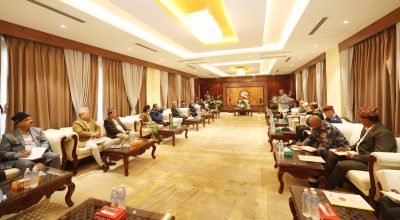
Narayan Prasad Ghimire
Kathmandu, May 1: Several countries are now mulling how digital technology including artificial intelligence (AI) could be applied along with indigenous knowledge to tackle most defining challenge of time- the climate crisis.
Similarly, advancement of digital technology and AI has gone to the extent that the super powers are debating how best they could deploy AI in warfare, while Nepal is reiterating the urgency of ‘digital departure’ and ‘digital transformation’ for a decade plus with much wait for stride.
Adoption of liberal economy opened up avenue to spur economic activities since restoration of democracy in 1990. Nepal prides on expansion of telecommunications service since then. Of course, Nepal gradually witnessed rise on internet penetration, IT infrastructures, availability of smartphones, digital teaching-learning, vibrant digital public spheres, digital transaction and trade. Lately, it a matter of pride to read the news that Nepali institution is running AI classes and camps to the foreign scholars, and conducting research on how AI could be used for cancer treatment.
A year back, a report prepared by the Institute for Integrated Development Studies (IIDS) generated encouraging media headlines. The report ‘Unleashing IT: Advancing Nepal’s Digital Economy’ elated both the government and IT sectors. It shared the finding that the IT service export (ITes) industry in Nepal valued nearly USD 515 million.
There were 106 IT service export companies and 14,728 IT freelancers in software development and technology and 51,781 ITeS freelancers involved in exporting IT services through various digital platforms, according to report. “The total IT service export reached USD 515 million in 2022, representing a growth of 64.2% since 2021. Both IT companies and freelancers experienced substantial growth, with IT companies recording an 80.5% increase in service exports compared to the previous year, and freelancers achieving a growth of 55.2%” the report mentioned.
Hindrances dwarf achievements
Irrespective of the achievements we have made in IT sectors over time, there is no denying that we are suffering host of problems and hindrances on intensification of digital transformation. The problems and challenges ranging from widening digital divide, dearth of digital literacy, constraints in law and policy sectors to infrastructures are evidently dwarfing the achievements.
Undoubtedly, reliable and quality expansion and adoption of information and digital technologies are prerequisites to holistic development. At a time when we have been touting IT as a foundational pillar of digital transformation, the problems warrant serious attention and engagement. The government has stressed time and again that there is no alternative to digital departure, but whether the government initiatives so far has resulted in significant stride is matter of study.
In this regard, the Digital Nepal Framework (DNF) launched by the government in 2019 could be enforced effectively to realize the digital transformation. It had finely outlined the sectors to incorporate IT, but its implementation was poor. Even the government officials have admitted that DNF was slow off the mark.
Similarly, as we hail expansion of internet which has facilitated communications and connected far-flung people to the world and lately eased digital business, the complaints on internet quality as speed, bandwidth, hacking of government websites, and cyber security concerns are on rise.
2G laws for 5G governance
Another important area to propel digital transformation is the guarantee of law and policies friendly to digital activities, innovation and service expansion.
In this connection, IT expert Dr Madhu Sudan Dahal said, “Infrastructural to legal and policy constraints are behind Nepal’s backwardness on IT and digital fronts.”
According to him, technology sees sweeping advances within three years, while our laws to look after these issues are 30 years old. “The law we made to deal with 2G service has to be invoked to deal with 5G services. Such a snail-placed progress in legal and policy spheres is sheer obstruction, while reliable electricity and internet are foundational infrastructures for digital transformation, for which we need to do a lot.” As he argued, we are still employing the Telecommunications Act, 1997 in the face of spurt of IT issues.
Nepal in international reports
When it comes to observation of Nepal’s status on IT and modern technology as AI, the global report can also provide adequate glimpse.
Earlier on March 2, this scribe had reported news on Nepal’s status on AI Readiness Index. Nepal was ranked 150th out of 193 countries in the Government AI Readiness Index, 2023, as per the report published by the Oxford Insights.
The report stated that Nepal was able to get the total score- 30.77. The total score is calculated from three bases- government pillar, technology sector pillar, and data and infrastructure pillar. With total score, 30.77, Nepal got 31.04 in government pillar, 24.21 in technology sector pillar, and 37.06 in data and infrastructure pillar.
Moreover, the Global Risk Report, 2024 prepared by World Economic Forum has mentioned false information: misinformation and disinformation as a challenging issue of present time.
It stated, “A growing distrust of information, as well as media and governments as sources, will deepen polarized views – a vicious cycle that could trigger civil unrest and possibly confrontation. There is a risk of repression and erosion of rights as authorities seek to crack down on the proliferation of false information – as well as risks arising from inaction.”
Dis/misinformation polluting media ecosystem
As internet and digital issues are trans-border phenomena, Nepal cannot deny such research analyses. We have also witnessed significant rise on false information polluting entire media ecosystem and discrediting journalism as well. Ensuring free, secure and open internet should be kept in mind while reinforcing initiatives for digital transformation and realizing the ambition of digital departure.
Importantly, taking confidence of private sectors, especially the youth IT entrepreneurs, researchers, innovators and scientists is imperative for Nepal to advance digital transformation. Creating conductive atmosphere along with investment and incentives will not only retain our IT talents but also contribute significantly to national income. Protection and promotion of human rights on cyber/digital spheres should be an equally significant focus to make digital departure meaningful. #RSS #nepal #AI














